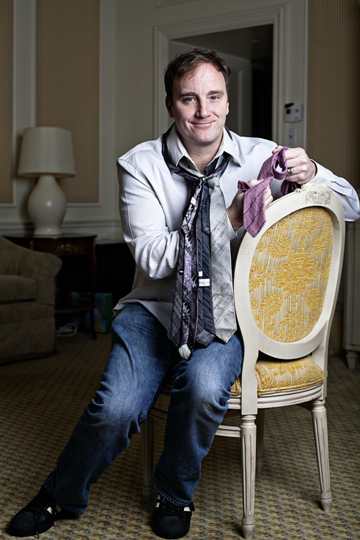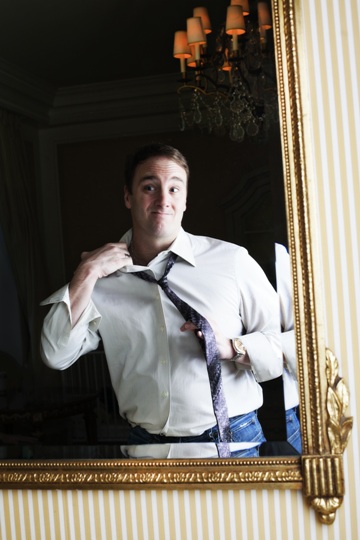The
beloved funnyman now rocks a powerful podcast.
One person not caught up in the
Charlie Sheen hoopla is comedian/actor Jay Mohr. In fact, Sheen,
sober, sane and coherent, chilled uncharacteristically with the
put-it-there-pal Mohr, who has a gift of bringing out the best
in people. The two shared the shit on the highly downloaded podcast
Mohr Stories, which Jay Mohr hosts.
Mohr tells me, “I think Charlie opened up with me because
for the first time in a decade, somebody was really asking him
detailed questions about things that he had acted in. I needed to
know about Platoon. I needed to know about Wall Street.
I needed to know about his relationship with Jim Abrahams on Hot
Shots. We both wanted to talk about Apocalypse Now, and
then the conversation took a turn toward great Oscar snubs (of which
Sheen’s father, Martin, was one for Apocalypse Now).”
Amazingly, the conversation continued
to take breathtaking turns, drawing us in deeper and deeper, as good
podcasts are able to do. Podcasts are new, but they mark the return
of the art of conversation, and Mohr knows how to hold one with the
best of them. Sheen indulged in his passion for baseball trivia, at
one point even showing Mohr his prized Babe Ruth autographed
baseball. Sheen hadn’t seemed this animated in a long time, in a way
that wouldn’t make headlines.
Mohr says, “I think sports and film
are interrelated in the passion they inspire in others and when you
get a good conversation going. So you go down this rabbit hole with
sports and movies.”
The rabbit hole in which Mohr travels
sports quite a ride. The New Jersey native began his long stand-up
life while still baby-faced and in high school, back in the late
Eighties. During those hungry years, he formed The Persona.
“The crutch was that I was so young
and that I really looked young,” he says, “which bred a complete
inferiority complex, I’m sure, which is why I probably have always
been so aggressive.”
 He ducked and rolled into the
cutthroat world of standup just in time for the great migration to
Hollywood, when every comedian was being considered as the next
Seinfeld.
He ducked and rolled into the
cutthroat world of standup just in time for the great migration to
Hollywood, when every comedian was being considered as the next
Seinfeld.
“I got in right under the curtain
closing of the late Eighties comedy boom,” he says. “I was just tall
enough to ride that ride. I rode to Buffalo for $50, and I knew it
was costing me $150, but I had to go show people in Buffalo because
maybe they will invite me back to headline another time.”
His future shuffle to Buffalo would
have to wait. Before not very long at all, he was featured on Saturday
Night Live (1993-1995) and he played the sitcom brother on
season one of The Jeff Foxworthy Show. Then, if you can
believe it hadn’t happened yet, came The Big Break.
Mohr explains, “Cameron Crowe called
me on the set of The Jeff Foxworthy Show and said, ‘What are
you doing for the next three months?’ I thought, ‘I’m going to be
the biggest star in the world. This is it. I am on my way.’”
The classic role of sleazy agent Bob
Sugar in Jerry Maguire drop-kicked Mohr higher into the
beautiful sky. The film, released at the end of 1996, opened at #1
and eventually grossed over $273 million worldwide. Immediately
following came the romantic comedy Picture Perfect, where
Mohr played against 1997’s most recognizable woman, Jennifer
Aniston.
Forget Aniston — what was it like to see yourself up there on the
big screen?
“It’s almost seems entirely too
short,” he says. “It always seems entirely too brief. I’m a showoff.
I’m a comic. I like the parts with me in it the most.”
You’ve got to give him that, since he
earned every second of screen time he’s clocked.
“I come from a family that worked
their balls off,” he says. “I grew up in very middle-class,
Italian-Catholic/Irish-Catholic New Jersey. Every pair of socks in
that sock drawer you earned. Nothing you have was ever handed to
you. You worked for ten years to put a six-foot deck in the back of
your house. That was your reward.”
As the millennium turned, Fox offered
him the groundbreaking series Action, in which he played an
über-aggressive Hollywood producer Peter Dragon. The series
had “classic” written all over it, but many critics decreed “too
inside!”
“It was ahead of its time,” Mohr
says. “It may have behooved Fox to try it on another night instead
of simply canceling it.”
 Eventually, as the digital age took
hold of audiences and sent them scattering and fractioning, Mohr
went for what he does best.
Eventually, as the digital age took
hold of audiences and sent them scattering and fractioning, Mohr
went for what he does best.
“I have only one discernible skill,”
he says, “and it’s talking. One thing I’ve always wished I could
change about myself is my inability to just stop talking. They told
me that since I was in first grade. I always got thrown out of class
because I wouldn’t stop talking.”
If only those teachers could see him
now, hosting one of the most downloaded podcasts on the planet. His
Mohr Stories features his brand of banter-with-the-buddies,
along with a heapin’ helpin’ of his brilliant mimicry (his
impressions of Colin Quinn, Norm MacDonald, Woody Allen and
Christopher Walken, among others, must not be missed). He also
banters with the likes of Jay Leno, The Black Crowes, fellow podcast
king Adam Carolla, and even former death-row inmate Damien Echols.
“I do pride myself on the positivity
of the podcast,” he says. “I’m not really ball washing as much as
you may think.”
The conversations are at the very
least compelling, especially the can’t-miss one-on-one with former
boxer Ray Mancini, who discusses the accidental death of his
challenger, South Korean boxer Duk Koo Kim, in 1982. The incident,
which was one big sucker punch in the history of sports, spiraled
Mancini into a deep depression, which he has battled ever since.
Mohr says, “What’s amazing to me about the Ray Mancini
interview is when he cries. He cries at the memory of his mother
icing his hand. It blew me away. People don’t realize that Ray
Mancini retired at 24. That’s when guys start in boxing. They
nurse you along until you go pro. He had a lot left. He left a lot
on the table. But when your hands end someone’s life, it sort of
takes that out of you. I’m talking to a man who has killed someone,
and now this word has more import than it has ever had.”
For Mohr, the alpha and the omega is
the late George Carlin. (“He was pretty obsessive-compulsive about
his act being perfectly timed.”) Another comedy hero of his is
unlikely: his beautiful wife, Nikki Cox, late of the series Las
Vegas.
“She’s funnier than any writer that I
had write things for me,” he says. “She’s much more dada than
I am. My standup is at least half her writing. She’ll actually hand
me pieces of paper on an airplane while I’m sleeping. She’ll write
things that I never would have thought of.”
Long trip, and in many ways, just
beginning. New man, making fresh with the old tricks. But a Mohr
Stories podcast promises big humor with a dash of reflection.
You’re listening to a man who has been around the block and lived to
tell the tale. And, he admits, he is still learning when to keep his
think-quick mouth shut.
He says, “It takes a long time to stand there and simply be
comfortable in the quiet.”
Email
us Let us know what you
think.